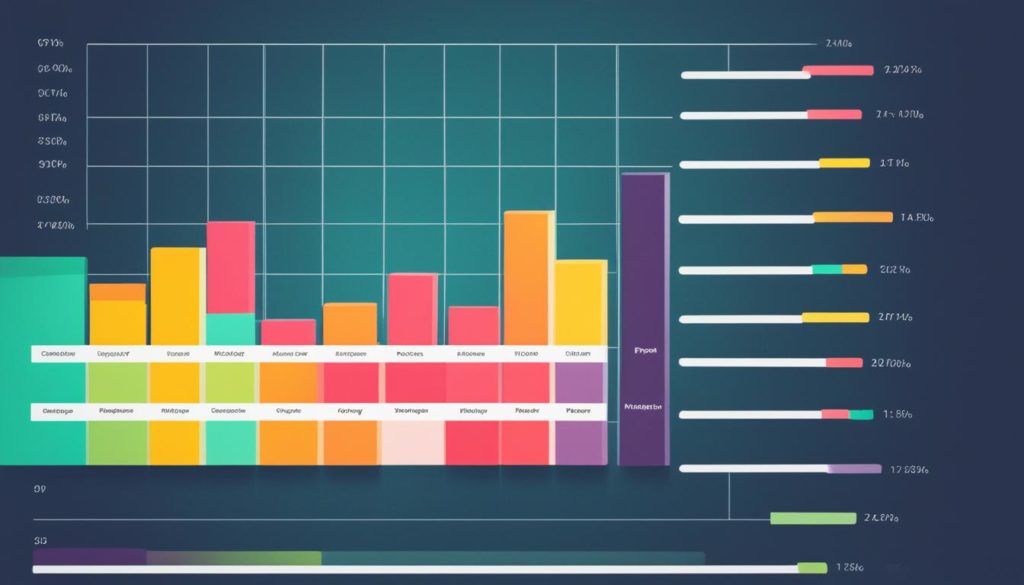
Did you know PHP is behind 77.9% of websites using a clear server-side language? Its wide use shows its important role in web development. This ranges from small to big businesses. But, as top web development alternatives surface, things are changing. New technologies show varied strengths. Let’s look into PHP alternatives for modern, advanced web solutions.
PHP’s rich ecosystem and Laravel integration are appealing. Yet, developers are looking for PHP alternatives due to some flaws. We must know not just the good but also the bad of our tools. Concerns like security flaws and slow performance in complex apps push us to explore beyond PHP. We’re encouraged to compare PHP with other languages and find the best alternative to PHP web development. The goal is to meet the needs of today’s web.
Choosing alternatives to PHP is not just about switching. It’s about changing how we make web apps. Using PHP Web Development Alternatives can make digital experiences more adaptive, secure, and efficient. This aligns with the expectations of modern users. As we reach this tech crossroads, we’re set for an exciting exploration of the most popular PHP alternatives. Each comes with its unique benefits and some offer a completely new approach.
Key Takeaways
- Understanding the widespread use of PHP and acknowledging the emerging need for alternatives.
- Recognizing the importance of security, performance, and coding efficiency in web development.
- Assessing the appeal of PHP alternatives in terms of performance, security, and architectural benefits.
- Identifying the significance of frameworks and ecosystems when considering alternatives to PHP for web development.
- Considering the balance between established practices and innovative approaches in web development languages comparison.
Understanding the Need for Alternatives to PHP in Modern Web Development
Web development is ever-changing, and we often reconsider the tools we use. PHP has been important for building dynamic web pages. But as tech advances, we look for better, safer, and faster programming options. This search helps us make web applications that are not just working but also strong and forward-thinking.
Current Status of PHP in the Web Development Hierarchy
PHP was once at the top, but now its place in web development is changing. While it’s still popular and familiar, its slow updates and consistency issues raise concerns. This shifts its role and prompts us to rethink its advantages in web development.
Identifying the Limitations Encountered with PHP
Striving for modern web standards, we see PHP’s shortcomings. Its security issues, lack of new tech support, and uneven coding standards are problems. These issues affect app performance and security, problems newer web frameworks handle better.
What is Fueling the Shift Towards PHP Web Development Alternatives?
People want safer, faster web apps with cleaner code. This leads to preferring languages like JavaScript, Python, and Ruby. They offer strict types, better coding, and strong frameworks. These languages are gaining favor for meeting today’s web development needs.
Choosing PHP alternatives is about keeping pace with tech and making web apps ready for the future. By using more dynamic languages, web development is reaching new innovation and efficiency levels.
The Emergence of Python as a Strong Contender
When looking at languages for web development, Python in web development stands out. Especially when comparing PHP versus Python. Python’s easy-to-understand syntax makes coding simpler.
Django, a Python framework, makes it quick to create web applications. This challenges PHP’s leading position. Its speed and easy maintenance make it valuable.
- Readability and concise syntax enhance development velocity
- Ease of debugging shortens development cycles
- Frameworks like Django allow for rapid, scalable web solution crafting
- A robust community supports innovation and problem-solving
Python has become crucial for fast and scalable web projects. The PHP versus Python discussion shows Python’s edge. It’s seen as a dynamic language for web development for today and tomorrow’s technology.
Diving Into JavaScript’s Full-Stack Capabilities
Exploring the world of web development, we see JavaScript’s vital role in full-stack development. This versatile language has grown from simple client-side scripting to complex server-side tasks through Node.js. We’re going to look at how JavaScript enhances web development, improving both frontend and backend features.
How JavaScript Transforms Client-Side Interactions
JavaScript makes web pages more dynamic and interactive, reacting instantly to user actions. With JavaScript, developers can craft responsive interfaces. It’s key for tasks like checking forms, creating animations, and managing user input without reloading the page. These smooth interactions boost user happiness and involvement.
Node.js and the Advent of JavaScript on the Server
The launch of Node.js was a game-changer for JavaScript, connecting frontend and backend. With Node.js, JavaScript operates on servers, managing requests without waiting. This efficiency is perfect for high-demand, scalable apps, including chat platforms and online games.
Now, let’s look at the specific advantages of using JavaScript for full-stack development, for both users and developers:
| Area | Benefits |
|---|---|
| Development Speed | Quicker development cycles by using the same language across the stack. |
| Performance | Node.js’s asynchronous nature boosts app performance and throughput. |
| Maintenance | Uniform language and shared codebase simplify maintenance and updates. |
| Scalability | The event-driven architecture of Node.js handles many connections at once. |
JavaScript’s dual role in both client and server sides keeps it at the forefront of client-side scripting, challenging traditional server languages. Full-stack development with JavaScript simplifies developer tasks and enriches apps, ensuring smooth, powerful user experiences.
Ruby on Rails: Combining Elegance with Efficiency
Ruby on Rails in web development is more than just coding. It’s about a philosophy that boosts productivity with elegant solutions. We love this framework because it makes the development process smoother. It uses a special approach that speeds things up and makes sure our apps are strong and can grow.
The beauty of working with Ruby is its clean, easy-to-understand code. This makes fixing and upgrading things much simpler. With Ruby on Rails, we can finish high-quality projects fast. This is thanks to a huge library of gems that help solve common issues.
Efficient Ruby frameworks reduce unnecessary code, a big issue in other environments. Now, let’s see why Ruby on Rails is a top choice compared to other frameworks:
| Feature | Ruby on Rails | Other Frameworks |
|---|---|---|
| Speed of Development | Fast due to built-in modules | Varies widely |
| Code Conciseness | Highly concise and readable | Often verbose |
| Community Support | Extensive and active | Moderate to high |
| Convention over Configuration | Core Philosophy | Less emphasis |
Using Ruby on Rails lets us be efficient and elegant. It’s become a favorite among modern web developers. They like its reliability and the flexibility it offers in building applications.
Exploring the Robust and Versatile Java Environment
Java is a key player in the web development game today. It shines in handling large-scale Java projects and innovating in Java performance and security. Java is great for creating strong web applications that need a reliable platform.
The Enduring Presence of Java in Large-Scale Development
Java’s design helps with big and complicated web systems, which is why big companies love it. Its frameworks and libraries make developing and keeping up large-scale applications easier. This is why many big businesses choose Java.
Java’s Ecosystem: A Blend of Performance and Security
Java stays popular because it focuses on being fast and safe, two must-haves in the digital world today. Its setup supports tough systems that can handle heavy duty performance while keeping them safe from security threats. That’s why choosing Java for web development is a safe bet.
Here’s an example of how Java manages to be both fast and secure in complex situations:
| Feature | Impact on Security | Impact on Performance |
|---|---|---|
| JVM (Java Virtual Machine) | Enables secure and portable code across platforms. | Optimizes performance without the need for recompilation. |
| Automatic Garbage Collection | Helps in preventing memory leaks and other vulnerabilities. | Improves application efficiency by managing memory resources. |
| Advanced Security Managers | Offers strict access control and execution privileges. | Ensures high-performance operations by minimizing risk factors. |
Java is still a major force in making web applications that are secure and can scale. Whether starting new projects or making current ones better, Java’s performance and security features show its strength in web development today.
PHP Web Development Alternatives: Revealing Viable Candidates
As web development changes, finding viable PHP alternatives is key for developers. They need these to make their projects more efficient and perform better. We’ve found several important languages perfect for different web projects.
The choice of web development language is crucial for a site’s success. Things like the size of the project, security needs, and ability to work with other systems matter a lot. Exploring modern languages like Node.js and comparing them to PHP shows why they are attractive.
| Feature | PHP | Node.js | |
|---|---|---|---|
| Model | Blocking | Non-blocking, Asynchronous | |
| Performance | Optimized with JIT in PHP 8 | Faster operations and handling more tasks at once | |
| Development Speed | Quicker for many developers | Varies, depending on JavaScript skills | Main Use-Case Compared to PHP, Node.js is better for scalable and efficient apps, preferred by companies focused on web improvement.When choosing a web application language, firms need to look at many aspects. They must ensure the language fits their immediate and future plans. Knowing the best web project languages is essential for successful project creation. By using more cutting-edge frameworks, we’re finding new paths in web development. This lets us bring to life fresh ways of solving problems that PHP couldn’t handle easily. Checking and adopting new web technologies keeps us leading. Our focus on improving how we work ensures we offer solutions that match the fast-changing market demands. |
Conclusion
In the fast-paced digital world, we developers constantly search for the best PHP Web Development Alternatives. We discover many great options, each with unique benefits for web building. Python wows us with its straightforward approach, while JavaScript offers endless possibilities with its full-stack options.
Ruby on Rails wins us over with its easy-to-follow principles. Java, on the other hand, stands out for its strong performance and security measures. These choices show us the richness of web development tools available today.
Choosing an alternative to PHP is a thoughtful choice. It’s about looking at several key factors. These include the need for quick development times, versatile platforms, and meeting the security and speed demands of today’s apps. PHP, however, remains relevant with newer versions like PHP 7, showing its continued value.
The push for innovation drives us to explore and sometimes switch to new options. Tools like Laravel and Django give us new ways to create cutting-edge and efficient web apps. Working with experts in these areas enhances our ability to deliver standout online experiences.
Through collaboration, we design bespoke solutions that leverage the best of each platform. This keeps our web development efforts nimble, ready for change, and always striving for digital excellence.
FAQ
What are some of the best alternatives to PHP Web Development?
Many languages make great alternatives to PHP. Python and JavaScript, with its platform Node.js, are popular choices. Ruby, Java, Golang, and Rust are also on the list. They offer benefits like better performance, easier code work, and quicker development.
How does the current status of PHP affect its role in the web development hierarchy?
PHP is still a key player in web development. But, its place is challenged by languages with new features and better security. Yet, PHP is updating and, with its broad use and support, keeps its important role.
What are the main limitations encountered with PHP that lead developers to seek alternatives?
The main issues with PHP are security weaknesses, slow performance, and inconsistent coding practices. These problems make development longer, upkeep tougher, and create security risks. Hence, developers look for more dependable options.
Why is Python considered a strong contender as an alternative to PHP for web development?
Python is loved for its easy-to-read nature and clear coding style. It speeds up development and simplifies fixing bugs. Django and other frameworks make it great for fast, maintainable web apps.
How has JavaScript transformed client-side interactions, and what is the role of Node.js?
JavaScript has changed the game for interactive web elements on the user’s end. Node.js lets JavaScript work on the server side too. This means better handling of tasks and improved site performance, offering a full package for developers.
What makes Ruby on Rails a preferred choice for web developers?
Ruby on Rails stands out because it simplifies developers’ decisions with its ‘convention over configuration’ approach. It’s packed with tools for fast app building. Plus, its clear code and focus on security make it a strong choice.
Why is Java an attractive option for large-scale web development projects?
Java’s ability to work across platforms, its strong memory management, and its security features make it ideal for big, enterprise projects. It fits well for companies needing reliable and scalable applications.
How should companies select the optimal language for their web development projects?
Selecting a development language requires looking at project needs, developer skills, and community support. Factors like framework availability and scalability also matter. This allows companies to find the best language or framework for their goals.
Future App Studios is an award-winning software development & outsourcing company. Our team of experts is ready to craft the solution your company needs.










